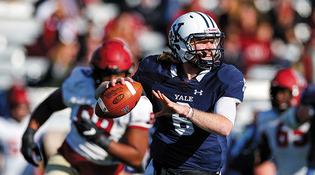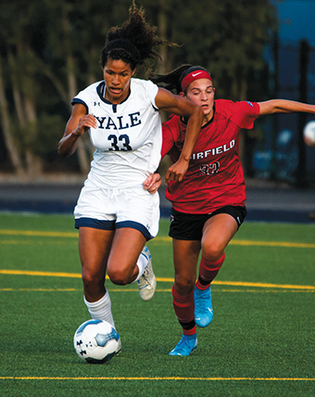 loading
loading
Sporting LifeFall highlights: three teams win Ivy titlesA thrilling football finale was just one piece of a great sports season. Evan Frondorf ’14, a risk analyst in San Francisco, writes frequently about sports for the magazine.  Matt DewkettQuarterback Kurt Rawlings ’20 led a dramatic comeback against Harvard that resulted in a 50–43 overtime win. View full imageFootball The sun had officially set at 4:26 p.m. over the Yale Bowl (which has no lights for its playing field), but the 136th edition of The Game was still under way—and heading into its second overtime. Yale went on to score first, making the score 50–43, their first lead in more than four hours. Just a few plays later, a Yale stop on fourth down gave the Bulldogs a stunning comeback victory and a share of the Ivy title, all while creating some of the matchup’s most memorable moments. “People ask me a question about this rivalry all the time,” said coach Tony Reno after the game. “They say, ‘What makes it so unique? What makes people say it’s the greatest rivalry in sport?’ I think it was on display today.” Heading into the final weeks of the season, it didn’t appear there would be much on the line for the Bulldogs besides bragging rights over Harvard. Picked first in the Ivies in the preseason poll, Yale faltered early in the season against Dartmouth, who then appeared unstoppable in their run to the title. On the second-to-last Saturday, however, a Big Green loss to Cornell opened the door for Yale. A win in The Game would mean a share of the Ivy title. It didn’t look good at first, as a relatively quiet first half left Yale down 15–3. Halftime proved the start of a significant shift in the day’s proceedings. Hundreds of students, alumni, and other participants from Yale, New Haven, and Harvard took to the field for a protest, calling primarily for the two universities to divest from any investments in fossil fuels. The protest delayed the start of the second half by almost 50 minutes. (For an article about the protest and Yale’s response, see page 18.) Then the game resumed, and the race against the scoreboard and the sun was on. Down as many as 19 points, the Bulldogs exploded for four touchdowns in the second half, led by quarterback Kurt Rawlings ’20, the league’s leading passer, who tallied a career-high 417 passing yards. Still, Yale was behind by 14 with 90 seconds left in regulation. With two laser touchdown passes by Rawlings and a successful onside kick recovery, Yale tied the game with seconds to play. The rest was truly history, in the rivalry’s highest-scoring matchup ever. Asked for a comparison with 1968’s historic 29–29 game, Reno said, “This game was a lot better,” quickly adding, “because we won.” As darkness set in, the Bulldogs hoisted the Ivy League trophy on the Class of 1954 Field. Camera flashes bounced off the polished metal. What had looked to be a season of potential disappointment had become one of the greatest in program history.
Volleyball On the road at Brown on October 26, the volleyball team notched an important Ivy win that was also a milestone: Erin Appleman’s 300th victory in her 16 years as head coach. Before the season was over, the team would also claim a share of the Ivy championship for the third straight year—the tenth title of Appleman’s career—and see five players awarded All-Ivy honors, including first-teamers Frances Arnautou ’20 and Samantha Bray ’22. As usual, the team’s season started out with a punishing non-conference schedule; they narrowly lost their first five games to major-conference opponents, including the likes of Indiana and USC. But the tough competition left them ready for Ivy play. They finished the season with a 10–2 Ivy record, tied with Princeton for the league title. The Bulldogs and the Tigers had split in their two regular-season games, each taking a win. Postseason, Princeton won the playoff to determine which team would get the Ivy League’s automatic bid to the NCAA tournament. But the year ended on a high note: in December, head coach Appleman was inducted into the Connecticut Women’s Volleyball Hall of Fame.
Men’s soccer This fall, Reese Stadium was the place to be for Yale fans. Over the course of an extraordinary year for the men’s soccer team, the Elis won game after game on their home field. In fact, for the first time, they were undefeated for the season at Reese. And the season kicked off with an 11-game unbeaten streak—the team’s longest since their 1935 campaign—catapulting the Bulldogs into the national rankings. The streak was broken only in a late October overtime loss to Maryland, the defending NCAA champion. With a season record of 13–3–2, Yale cruised to its first Ivy League title since 2005. For coach Kylie Stannard, who was named Ivy League Coach of the Year, the season represented the culmination of five seasons of turnaround. When Stannard joined, the men’s soccer program had hit a nadir, winning only one game apiece in the 2014 and 2015 seasons. Steady improvement brought Yale back to the Ivy crown, led by eight seniors that were among the first to be recruited by Stannard, a former associate head coach at Michigan State. “I’m beyond proud of what we achieved,” says team captain Miguel Yuste ’20, the Ivy’s leading scorer. Mark Winhoffer ’21, among the nation’s leaders in assists, was named Ivy League Offensive Player of the Year. Says Winhoffer, “This was the strongest bond we’ve had since I got here. We would fight for each other, run the extra yard, and not skip out on the details.” The Ivy title earned Yale a trip to the NCAA Tournament for the first time in 14 years. But the Bulldogs weren’t able to extend their magic into the postseason; they fell to Boston College 3–0 in the first round. “Our big-picture goal was winning the Ivy League. We achieved what we wanted going into the season,” says Yuste. “But we hoped to advance as far as possible in the tournament.” Winhoffer will get another chance next year, but Yuste can take solace in seeing his team rise from rock-bottom to the top. “I am truly gutted that the seniors had to end their careers in this way,” says Winhoffer. “But they put the jersey in a better place.”
 Nina LindbergAerial Chavarin ’20 led the women’s soccer team in goals and was named Ivy defensive player of the year. View full imageWomen’s soccer The women’s team was also a soccer sensation this year, with their own 5-game winning streak midway through the season and a proud final record of 11–4–1: the program’s best winning percentage since 2005. Aerial Chavarin ’20 was named Ivy League Defensive Player of the Year, while also leading the team in goals. It was a powerful response by the team in the face of a calamity—the implication of head coach Rudy Meredith, who had resigned at the end of last season, in the national “Varsity Blues” admissions scandal. Despite their forceful showing, the Bulldogs faced tough competition from Harvard and Brown, and they were unable to capture an Ivy title. Yale had hoped to qualify for one of 33 at-large bids to the 64-team NCAA Tournament, but were snubbed despite a national computer ranking in the 30s at the time of tournament selection. Then, days later, further shocking news befell the Bulldogs. A Yale Daily News investigation uncovered allegations of sexual misconduct and other impropriety by the team’s brand-new head coach, Brendan Faherty, at his former employer, the University of New Haven. Faherty denied the claims, but he is no longer at Yale. (See page 18.) Sarah Martinez, who has been an assistant coach of the team since January 2019, has been named the new head coach. Chavarin says the team’s woes off the field have been instructive. “If anything, my experience as a Yale women’s soccer player has taught me how to be resilient and adaptable in the face of adversity,” she says. “I have also learned the importance of staying together during tumultuous times. Overcoming these times as a group has made our successes and accomplishments that much more satisfying.”
The comment period has expired.
|
|